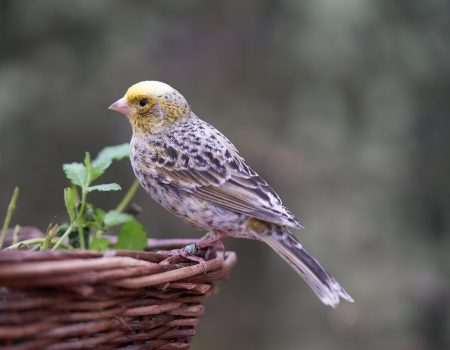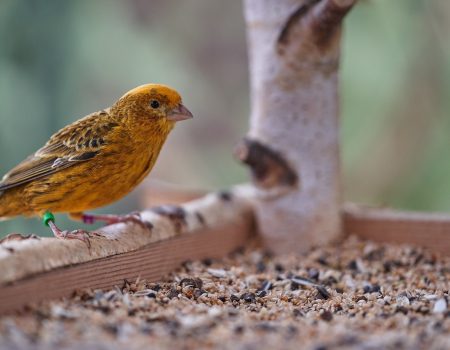As a canary owner, there’s nothing more rewarding than watching your feathered friend sing joyfully and flutter around the cage. But just like any pet, canaries need proper care to stay healthy, and one of the most important aspects to focus on is their respiratory health.
Canaries, with their delicate respiratory systems, are particularly vulnerable to respiratory issues, which can quickly lead to serious complications if not addressed. As a pet owner, understanding how to prevent these problems can help keep your bird happy, active, and healthy for years to come.
Read on as we’ll cover everything in this post.
What Causes Respiratory Problems in Canaries?
Before we dive into prevention, it’s important to understand what causes respiratory problems in canaries. These issues can often be traced back to environmental factors, some of which are within your control. Common causes include:
- Poor air quality: Canaries are highly sensitive to dust, mold, and other airborne irritants. Exposure to these can lead to respiratory distress.
- Toxins: Household chemicals, like cleaning products, aerosols, or air fresheners, can emit fumes that are harmful to your bird’s delicate lungs.
- Cold drafts: Canaries are sensitive to temperature changes. A drafty room or sudden temperature shifts can weaken their immune systems and make them more susceptible to illness.
- Overcrowded cages: Birds in cramped spaces are more likely to breathe in dust and bacteria, which can lead to respiratory problems.
By being aware of these common triggers, you can make simple adjustments to your bird’s environment that will go a long way in preventing respiratory issues.
How Can You Ensure Good Air Quality for Your Canary?
The air quality in your canary’s environment plays a huge role in maintaining respiratory health. Canaries are particularly sensitive to the air they breathe, so it’s crucial to keep their living area free from pollutants. Here are a few tips to help you improve air quality:
1. Clean Regularly
Dust, dander, and food particles can accumulate in your bird’s cage and the surrounding area. Regular cleaning is essential to prevent these irritants from building up.
- Cage cleaning: Clean your canary’s cage thoroughly at least once a week. Remove any uneaten food, soiled bedding, and droppings. Use bird-safe cleaners, or make a solution with mild soap and warm water.
- Surrounding area: Clean the area around the cage to avoid dust buildup. Vacuum regularly and use a damp cloth to wipe down surfaces.
2. Provide Proper Ventilation
Good airflow is essential for your canary’s respiratory health. Ensure that the room where your bird resides has adequate ventilation. Keep the window open for fresh air, or use a fan to circulate air. However, avoid placing the cage near direct drafts or vents, as this could lead to discomfort or illness.
3. Avoid Aerosols and Smoke
Never spray aerosols or use strong-smelling cleaning products around your canary. The fumes can irritate their lungs and lead to respiratory issues. Cigarette smoke and other airborne toxins are equally harmful, so it’s important to keep your bird in a smoke-free environment.

Maintaining a clean and sanitized environment is crucial for preventing respiratory infections in canaries. Studies indicate that 70% of avian respiratory issues can be traced back to poor hygiene and unsanitary living conditions. Regular cleaning of cages and perches helps eliminate pathogens that can cause respiratory problems.
How Can Temperature Control Help Prevent Respiratory Issues?
Canaries are sensitive to temperature changes, and sudden cold drafts can trigger respiratory problems. Maintaining a consistent, moderate temperature is key to preventing these issues.
1. Ideal Temperature Range
The ideal temperature for a canary is between 65°F and 75°F (18°C – 24°C). Avoid placing your bird’s cage in areas that experience significant temperature fluctuations, like near windows, air conditioners, or heaters.
2. Avoid Drafts
Keep your canary’s cage away from doors and windows that open and close frequently. Even a light breeze can cause discomfort for your bird, leading to respiratory issues. Also, avoid placing the cage near fans or air conditioners, as the cold air could be too harsh for their sensitive respiratory system.
3. Gradual Temperature Adjustments
If you need to change the temperature in the room, do so gradually. Sudden changes can stress your canary, making them more susceptible to illnesses. If you move your canary from one room to another, allow some time for them to adjust to the new environment.
How to Prevent Dust and Allergens Around Your Canary?
As mentioned earlier, dust and allergens are some of the biggest culprits when it comes to canary respiratory problems. Reducing these irritants will go a long way in keeping your bird’s lungs healthy.
1. Use Safe Bedding
When choosing bedding for your canary’s cage, opt for materials that don’t produce dust. Paper-based bedding or wood pellets are good alternatives to traditional sand or clay-based options, which can create dust clouds that irritate your bird’s airways.
2. Avoid Feather Dusters
While feather dusters might seem like an easy way to clean, they can stir up dust that settles in your canary’s cage. Instead, use a damp cloth or a vacuum with a HEPA filter to trap dust and allergens.
3. Keep the Cage in a Low-Dust Area
Place your canary’s cage in a part of the room with minimal dust and dirt. Avoid placing it near air vents, areas where you sweep, or places that might collect particles from open windows.
Proper ventilation significantly reduces the risk of respiratory infections. Research shows that canaries kept in well-ventilated areas experience up to a 50% decrease in respiratory issues compared to those in poorly ventilated environments. Ensuring fresh air circulation helps minimize airborne pathogens and irritants.
What Are the Signs of Respiratory Issues in Canaries?
Despite your best efforts, sometimes respiratory issues may still arise. Recognizing the early signs of illness is essential to providing prompt treatment. Common signs of respiratory distress in canaries include:
- Labored or rapid breathing: If you notice your canary breathing more quickly or heavily than usual, this could indicate respiratory issues.
- Wheezing or coughing sounds: Canaries may make odd noises if they have trouble breathing. If you hear wheezing, clicking, or other unusual sounds, it’s time to investigate further.
- Fluffed-up feathers: Birds often fluff their feathers when they’re sick, as a way of conserving heat or indicating discomfort.
- Changes in behavior: If your canary seems lethargic, isn’t eating, or appears to be sitting more quietly than usual, these could be signs of illness.
- Nasal discharge: Look for any discharge around your canary’s nostrils. This could be a sign of infection.
If you notice any of these signs, it’s important to consult a veterinarian right away. Early treatment can prevent further complications and help your canary recover more quickly.
Can a Healthy Diet Help Prevent Respiratory Problems?
A balanced diet plays a significant role in your canary’s overall health, including their respiratory system. Providing the right nutrients can strengthen their immune system and make them less susceptible to illnesses.
1. High-Quality Seed Mix
Ensure your canary is eating a well-balanced seed mix that includes a variety of seeds, such as millet, canary grass seed, and oats. You can supplement their diet with small amounts of fresh fruits and vegetables, like carrots, broccoli, and apples.
2. Hydration
Always provide fresh, clean water. Dehydration can lead to weakened immunity, making your canary more vulnerable to respiratory infections. Be sure to change the water daily.
3. Supplement with Calcium and Vitamins
Adding a vitamin and calcium supplement can help maintain your bird’s overall health. Make sure to use bird-specific supplements to prevent any deficiencies that may contribute to respiratory issues.
A balanced diet plays a vital role in respiratory health. It has been found that canaries receiving adequate vitamins and minerals, particularly Vitamin A, have a 30% lower incidence of respiratory infections. This vitamin is essential for maintaining healthy respiratory tissues and supporting the immune system, making nutritional support critical for preventing health issues.
Final Thoughts
Canaries are delicate creatures, and their respiratory health should be taken seriously. By providing a clean environment, maintaining proper temperature control, reducing allergens, and ensuring a healthy diet, you can significantly lower the risk of respiratory problems.
In addition, always be on the lookout for signs of distress, and consult a veterinarian if you have any concerns about your bird’s health. With these proactive steps, your canary can enjoy a long, happy life filled with beautiful songs.
References
Respiratory Infections in Birds: 2024 Guide on Causes and Care – Morningside Veterinary
Treatment of Respiratory Disease in Birds – VIN
Chronic Respiratory Disease (CRD) – Biosecurity Tasmania
Part 5 – Respiratory Diseases – NADIS
Disclaimer
This content on Bagrica is for informational purposes only. Consult a professional for pet care or farming advice. Bagrica is not liable for any actions taken based on this information.







No Comment! Be the first one.